歧义英语小汇总整理
有歧义的英语

sporting house 妓院(不是“体育室”)-dead president 美钞(上印有总统头像)(并非“死了的总统”)-lover 情人(不是“爱人”)busboy 餐馆勤杂工(不是“公汽售票员”)busybody 爱管闲事的人(不是“大忙人”)dry goods (美)纺织品;(英)谷物(不是“干货”)heartman 换心人(不是“有心人”)-mad doctor 精神病科医生(不是“发疯的医生”)eleventh hour 最后时刻(不是“十一点”)-blind date (由第三者安排的)男女初次会面(并非“盲目约会”或“瞎约会”)-personal remark 人身攻击(不是“个人评论”)-sweet water 淡水(不是“糖水”或“甜水”)-confidence man 骗子(不是“信得过的人”)-criminal lawyer 刑事律师(不是“犯罪的律师”)-service station 加油站(不是“服务站”)-rest room 厕所(不是“休息室”)-dressing room 化妆室(不是“试衣室”或“更衣室”)-horse sense 常识(不是“马的感觉”)-capital idea 好主意(不是“资本主义思想”)-familiar talk 庸俗的交谈(不是“熟悉的谈话”)black tea 红茶(不是“黑茶”)-black art 妖术(不是“黑色艺术”)-black stranger 完全陌生的人(不是“陌生的黑人”)-white coal (作动力来源用的)水(不是“白煤”)-white man 忠实可靠的人(不是“皮肤白的人”)-yellow book 黄皮书(法国政府报告书,以黄纸为封)(不是“黄色书籍”)-red tape 官僚习气(不是“红色带子”)-green hand 新手(不是“绿手”)-blue stocking 女学者、女才子(不是“蓝色长统袜”)-China policy 对华政策(不是“中国政策”)-Chinese dragon 麒麟(不是“中国龙”)-American beauty 一种玫瑰,名为“美国丽人”(不是“美国美女”)-English disease 软骨病(不是“英国病”)-Indian summer 愉快宁静的晚年(不是“印度的夏日”)-Greek gift 害人的礼品(不是“希腊礼物”)-Spanish athlete 吹牛的人(不是“西班牙运动员”)-French chalk 滑石粉(不是“法国粉笔”)---pull one's leg 开玩笑(不是“拉后腿”)-in one's birthday suit 赤身裸体(不是“穿着生日礼服”)-eat one's words 收回前言(不是“食言”)-an apple of love 西红柿(不是“爱情之果”)-handwriting on the wall 不祥之兆(不是“大字报”)-bring down the house 博得全场喝彩(不是“推倒房子”)-have a fit 勃然大怒(不是“试穿”)-make one's hair stand on end 令人毛骨悚然—恐惧(不是“令人发指——气愤”)- be taken in 受骗,上当(不是“被接纳”)-think a great deal of oneself 高看或看重自己(不是“为自己想得很多”)-pull up one's socks 鼓起勇气(不是“提上袜子”)-have the heart to do (用于否定句)忍心做……不是“有心做”或“有意做”)- --What a shame! 多可惜!真遗憾!(不是“多可耻”)-You don't say! 是吗!(不是“你别说”)-You can say that again! 说得好!(不是“你可以再说一遍”)-I haven't slept better. 我睡得好极了。
让人容易歧义的英文

有些英文不要不懂装懂sporting house 妓院(不是“体育室”)dead president 美钞(上印有总统头像)(并非“死了的总统”)lover 情人(不是“爱人”)busboy 餐馆勤杂工(不是“公汽售票员”)busybody 爱管闲事的人(不是“大忙人”)dry goods (美)纺织品;(英)谷物(不是“干货”)heartman 换心人(不是“有心人”)mad doctor 精神病科医生(不是“发疯的医生”)eleventh hour 最后时刻(不是“十一点”)blind date (由第三者安排的)男女初次会面(并非“盲目约会”或“瞎约会”)personal remark 人身攻击(不是“个人评论”)sweet water 淡水(不是“糖水”或“甜水”)confidence man 骗子(不是“信得过的人”)criminal lawyer 刑事律师(不是“犯罪的律师”)service station 加油站(不是“服务站”)rest room 厕所(不是“休息室”)dressing room 化妆室(不是“试衣室”或“更衣室”)horse sense 常识(不是“马的感觉”)capital idea 好主意(不是“资本主义思想”)familiar talk 庸俗的交谈(不是“熟悉的谈话”)black tea 红茶(不是“黑茶”)black art 妖术(不是“黑色艺术”)black stranger 完全陌生的人(不是“陌生的黑人”)white coal (作动力来源用的)水(不是“白煤”)white man 忠实可靠的人(不是“皮肤白的人”)yellow book 黄皮书(法国政府报告书,以黄纸为封)(不是“黄色书籍”)red tape 官僚习气(不是“红色带子”)green hand 新手(不是“绿手”)blue stocking 女学者、女才子(不是“蓝色长统袜”)China policy 对华政策(不是“中国政策”)Chinese dragon 麒麟(不是“中国龙”)American beauty 一种玫瑰,名为“美国丽人”(不是“美国美女”)English disease 软骨病(不是“英国病”)Indian summer 愉快宁静的晚年(不是“印度的夏日”)Greek gift 害人的礼品(不是“希腊礼物”)Spanish athlete 吹牛的人(不是“西班牙运动员”)French chalk 滑石粉(不是“法国粉笔”)pull one's leg 开玩笑(不是“拉后腿”)in one's birthday suit 赤身裸体(不是“穿着生日礼服”)eat one's words 收回前言(不是“食言”)an apple of love 西红柿(不是“爱情之果”)handwriting on the wall 不祥之兆(不是“大字报”)bring down the house 博得全场喝彩(不是“推倒房子”)have a fit 勃然大怒(不是“试穿”)make one's hair stand on end 令人毛骨悚然—恐惧(不是“令人发指——气愤”)be taken in 受骗,上当(不是“被接纳”)think a great deal of oneself 高看或看重自己(不是“为自己想得很多”)pull up one's socks 鼓起勇气(不是“提上袜子”)have the heart to do (用于否定句)忍心做……不是“有心做”或“有意做”)What a shame! 多可惜!真遗憾!(不是“多可耻”)You don't say! 是吗!(不是“你别说”)You can say that again! 说得好!(不是“你可以再说一遍”)I haven't slept better. 我睡得好极了。
趣味英语:英语中的歧义句
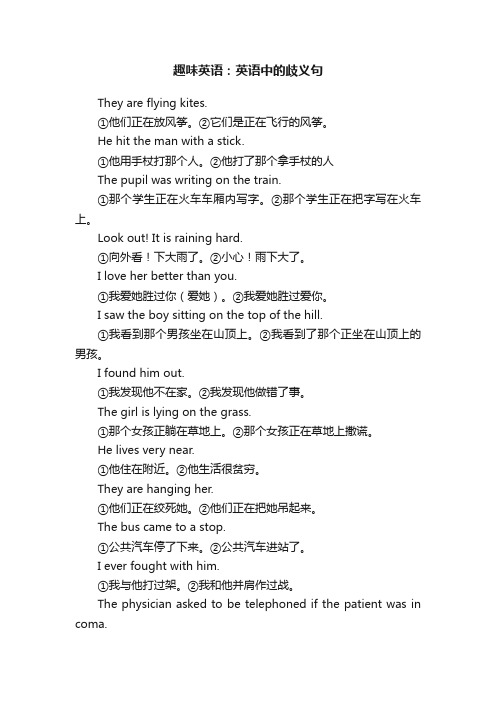
趣味英语:英语中的歧义句They are flying kites.①他们正在放风筝。
②它们是正在飞行的风筝。
He hit the man with a stick.①他用手杖打那个人。
②他打了那个拿手杖的人The pupil was writing on the train.①那个学生正在火车车厢内写字。
②那个学生正在把字写在火车上。
Look out! It is raining hard.①向外看!下大雨了。
②小心!雨下大了。
I love her better than you.①我爱她胜过你(爱她)。
②我爱她胜过爱你。
I saw the boy sitting on the top of the hill.①我看到那个男孩坐在山顶上。
②我看到了那个正坐在山顶上的男孩。
I found him out.①我发现他不在家。
②我发现他做错了事。
The girl is lying on the grass.①那个女孩正躺在草地上。
②那个女孩正在草地上撒谎。
He lives very near.①他住在附近。
②他生活很贫穷。
They are hanging her.①他们正在绞死她。
②他们正在把她吊起来。
The bus came to a stop.①公共汽车停了下来。
②公共汽车进站了。
I ever fought with him.①我与他打过架。
②我和他并肩作过战。
The physician asked to be telephoned if the patient was in coma.①医生要求若病人昏迷了就打电话给他。
②医生要求打电话告诉他病人是否昏迷。
He is playing with her.①他正在和她一起玩耍。
②他正在玩弄她。
People found putting up false advertisements in the streets will be punished according to the new law.①根据新法规,被发现在街上贴虚假广告的人将受到惩罚。
容易产生歧义的英语句子

容易产生歧义的英语句子
英语是一门非常复杂的语言,有时候同样的一句话可能由于语法、词义等方面的不同而产生歧义。
以下是一些容易产生歧义的英语句子: 1. 'I saw her duck.' 这句话可能被理解为“我看到她躲避”,也可能被理解为“我看到她鸭子”。
2. 'I shot an elephant in my pajamas.' 这句话可能被理解
为“我穿着睡衣打了一只大象”,也可能被理解为“我在大象睡衣里
开枪”。
3. 'Time flies like an arrow; fruit flies like a banana.' 这句话可能被理解为“时间像箭一样飞逝;水果像香蕉一样飞”,也
可能被理解为“时间像一只箭射向水果;水果像一只香蕉被飞”。
4. 'I refuse to eat the cheese unless it's blue.' 这句话可能被理解为“除非奶酪是蓝色的,否则我拒绝吃”,也可能被理解
为“我拒绝吃奶酪,因为它有蓝色的霉菌”。
5. 'I saw the man with the binoculars.' 这句话可能被理解为“我看到一个带着双筒望远镜的男人”,也可能被理解为“我在双
筒望远镜里看到了一个男人”。
以上这些句子可能会在不同的场合产生歧义,因此在进行英语交流时要注意语法和语境,以免造成不必要的误解。
- 1 -。
歧义句类型分析
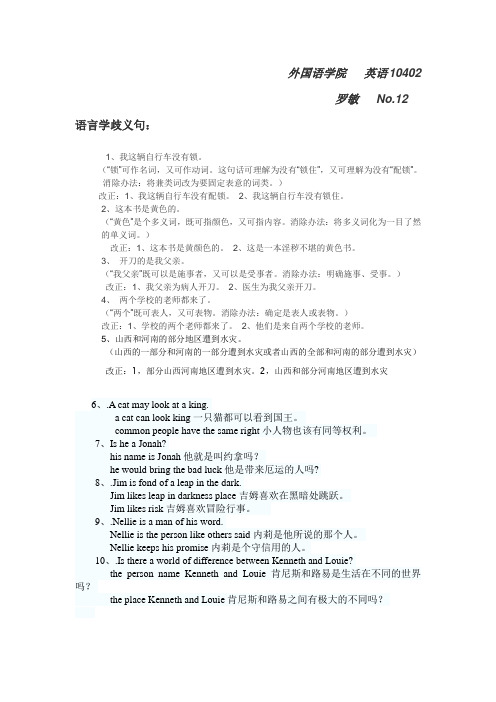
外国语学院英语10402罗敏No.12语言学歧义句:1、我这辆自行车没有锁。
(“锁”可作名词,又可作动词。
这句话可理解为没有“锁住”,又可理解为没有“配锁”。
消除办法:将兼类词改为要固定表意的词类。
)改正:1、我这辆自行车没有配锁。
2、我这辆自行车没有锁住。
2、这本书是黄色的。
(“黄色”是个多义词,既可指颜色,又可指内容。
消除办法:将多义词化为一目了然的单义词。
)改正:1、这本书是黄颜色的。
2、这是一本淫秽不堪的黄色书。
3、开刀的是我父亲。
(“我父亲”既可以是施事者,又可以是受事者。
消除办法:明确施事、受事。
)改正:1、我父亲为病人开刀。
2、医生为我父亲开刀。
4、两个学校的老师都来了。
(“两个”既可表人,又可表物。
消除办法:确定是表人或表物。
)改正:1、学校的两个老师都来了。
2、他们是来自两个学校的老师。
5、山西和河南的部分地区遭到水灾。
(山西的一部分和河南的一部分遭到水灾或者山西的全部和河南的部分遭到水灾)改正:1,部分山西河南地区遭到水灾。
2,山西和部分河南地区遭到水灾6、.A cat may look at a king.a cat can look king一只猫都可以看到国王。
common people have the same right小人物也该有同等权利。
7、Is he a Jonah?his name is Jonah他就是叫约拿吗?he would bring the bad luck他是带来厄运的人吗?8、.Jim is fond of a leap in the dark.Jim likes leap in darkness place吉姆喜欢在黑暗处跳跃。
Jim likes risk吉姆喜欢冒险行事。
9、.Nellie is a man of his word.Nellie is the person like others said内莉是他所说的那个人。
Nellie keeps his promise内莉是个守信用的人。
词汇歧义[整理]
![词汇歧义[整理]](https://img.taocdn.com/s3/m/f03fa01bbb1aa8114431b90d6c85ec3a86c28b53.png)
词汇歧义(1)They can fish.当解释成他们会钓鱼时“can”是情态动词,“fish”是不及物动词,此句说的是一种能力。
当解释成他们做鱼罐头时,我们把“can”看成是及物动词,“fish”是名词。
由于“can”和“fish”都有两个词性,而且在这个句子中都能讲得通,因此产生了两种不同的解释。
(2)You will forget tomorrow.当解释成明天你就会把一切都忘记时,“tomorrow”是副词,当解释成你会忘记明天发生的一切时,“tomorrow”是名词。
air n. 交易会 a. 公平合理的 fare n. 车船费 vi. 进展;过活 He brought the piglets to the fair to sell.他把小猪赶到集市上卖. Everybody must be given a fair share of the harvest.每个人得到的粮食数量应该是均等的. How much is the air fare to Tianjin?到天津的飞机票要多少钱? How did you fare in New York? 你在纽约过得怎么样? 2. principle n. 原理;原则 principal a. 主要的Mr. Connors believes that truthfulness is the best principle. 克诺斯先生认为真理才是最好的原则. The scientist was the principal speaker at the meeting. 那位科学家是会议上的首要发言者. 3. coarse a. 粗糙的;粗鲁的;粗俗的 course n. 路线;课程His coarse manners deserve to be criticized.他粗鲁的行为应该受到责备. Highway across the country is in course of construction. 横贯该国的一条公路正在建设之中. The president encouraged the students to take more courses. 校长鼓励学生们多修几门课程. 4. complement n. 补充物;使完备之物 compliment n. 恭维;问候 Lively conversation is a complement to a party. 欢快的谈话有助于聚会的气氛. Give my compliments to your mother. 请代我向你妈妈问好. Thank you for your compliments. 谢谢您的夸奖. 5. council n. 委员会;理事会 counsel n. 商议;劝告v. 建议;劝告 The U.N. Security council consists of five countries.联合国安理会由五个国家组成. My father gave me a wise counsel and I followed it.父亲给我的忠告很明智,所以我听取了他的忠告. His brother counseled him to think carefully before making a decision. 他哥哥建议他做决定之前仔细考虑. 6. stationary a.固定的;静止的 stationery n. 文具 The weatherman said that the warm front would be stationary for several days. 气象预报员说,暖锋将停滞数天不移动. Lucy wrote to her mother on the company's stationery. 露西用公司的信笺信封给妈妈写信. 7. peace n. 和平;安宁 piece n. 块;片;篇章;条 Peace was restored after a week of disturbance. 经过一周的骚乱又恢复了平静. Duke ate a piece of chocolate cake for dessert. 杜克用甜食时吃了一块巧克力. 8. desert v. 丢开;遗弃;开小差 dessert n. 餐后甜点 After deserting his post the soldier ran away from the camp. 那个战士从帐篷弃职而逃. We had apple pie for dessert last night.我们昨晚吃的甜食是苹果. 9. weather n. 天气;气象; whether conj. 是否;不管 Our flight was delayed because of unfavorable weather. 因天气问题,我们的航班晚点了. We do not know whether we will go away for our vacation or stay home. 是出外度假还是呆在家里我们一时拿不定主意. 10. lightning n. 闪电lightening n. 轻松;减轻;发亮 The tall tree on the bank was struck by lightning. 岸边的高树遭了雷劈. Mr. Blare was invited to be in charge of lightening of stage. 布莱尔先生被邀负责舞台的灯光设计. My heart began lightening when hearing the good news. 听到这个好消息我的心情开始轻松了A heteronym is a "word having a different sounding and meaning but the same spelling." (minute - unit of time; minute - very small) 1. address My address is Easy Street. She will address the crowd. 2. bow She wears a bow in her hair. Bow to the audience at the end. 3. close Please close the door. She sat close tohim. 4. content The content of the talk is simple. I am content to just stay home. 5. convert She is a convert to exercise. She will convert the machine. 6. digest You will digest your food in time. I never read Reader's Digest. 7. dove She dove into the water. The dove makes a cooing sound. 8. invalid She was an invalid in the hospital. Your license is invalid. 9. lead He will lead the parade. The metal lead is very heavy. 10. live Where do you live? It was a live snake. 11. minute I'll be with you in just a minute. The insect had minute legs. 12. object It was a valuable object. We would object if she went. 13. present We got a nice present from her. She will present the awards to all. 14. project Is your science project done? Project the movie on the screen. 15. read She likes to read books. She read a story to the boy. 16. record Let's record that movie. She bought a record album. 17. row The kids were all sitting in a row. They had a row over the noise. 18. sow We shall sow the wheat today. The old sow was in the pigpen. 19. subject The subject of my talk is autos. They will subject them to torture.20. tear Don't shed a tear for her loss. Don't tear the photograph. 21. wind The wind blew strong last night. Wind the string on a stick. 22. wound He received a bullet wound. He wound up the rope. [/face][/size]tear [tie] 眼泪 tear [tie] 撕裂 sow [seu] 播种 sow [sau] 母猪 minute [minit] 分钟 minute [mai nju:t] 微小的还有:abstract, accent, affix, attribute, augment, compound, com-press, concert, conduct, confine, conflict, conscript, consort, construct, contest, contract, contrast, converse, convert, convict, de-crease, detail, digest, discard, discount, discourse, escort, export, extract, ferment, forecast, import, impress, incline, increase, insult, object,perfume, permit, pervert, prefix, present, produce, progress, protest, rebel, record, refill, re-fix, refund, regress, reject, segment, subject, suffix, survey, suspect, torment, trans-form, transplant, transport, upset。
易生歧义的英语口语
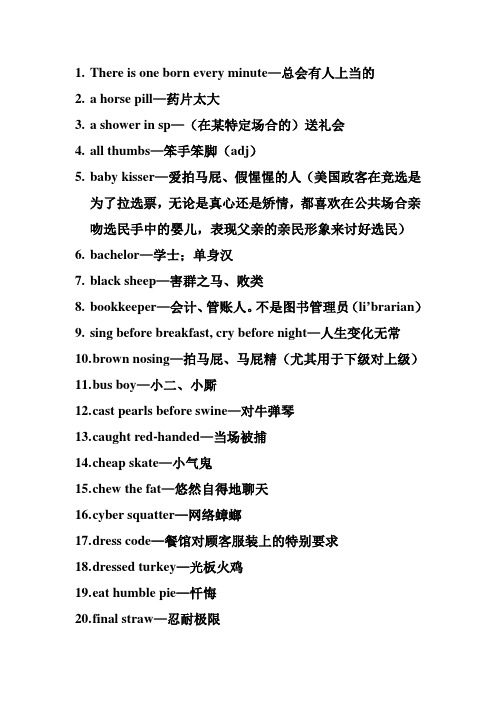
1.There is one born every minute—总会有人上当的2.a horse pill—药片太大3.a shower in sp—(在某特定场合的)送礼会4.all thumbs—笨手笨脚(adj)5.baby kisser—爱拍马屁、假惺惺的人(美国政客在竞选是为了拉选票,无论是真心还是矫情,都喜欢在公共场合亲吻选民手中的婴儿,表现父亲的亲民形象来讨好选民)6.bachelor—学士;单身汉7.black sheep—害群之马、败类8.bookkeeper—会计、管账人。
不是图书管理员(li’brarian)9.sing before breakfast, cry before night—人生变化无常10.b rown nosing—拍马屁、马屁精(尤其用于下级对上级)11.b us boy—小二、小厮12.c ast pearls before swine—对牛弹琴13.c aught red-handed—当场被捕14.c heap skate—小气鬼15.c hew the fat—悠然自得地聊天16.c yber squatter—网络蟑螂17.d ress code—餐馆对顾客服装上的特别要求18.d ressed turkey—光板火鸡19.e at humble pie—忏悔20.f inal straw—忍耐极限21.h ot air—空话、大话22.m ind in the gutter—心思不正(get one’s mind out of thegutter)23.g ive me five—拍我手掌,替我高兴或庆祝24.g o into the woods—方便25.b e out of the woods—脱离困境26.g reen—生涩、不熟练27.h ave a turkey on one’s back—喝醉酒或吸毒成瘾28.s omeone has a window—有空档时间29.h it the sack(睡袋/床)—睡觉30.h orse around—一起玩(play around)31.I was not born yesterday—我又不是小孩子32.s b be in the dark—对……一无所知33.b e in deep/hot water—在水水深火热中34.k eep one’s eyes open—某人会留意的35.k ill someone with kindness—热情得让人受不了36.k nock back—花费(cost)37.k nock out—请便(go ahead/ go for it)38.b e on the street—被炒鱿鱼39.p arty pooper—令人扫兴/煞风景的人40.p lay sth by ear—见机行事41.p ut sb to sleep—终止某人的生命/(为动手术而使用麻醉剂)使……失去知觉42.p ut the cart(车) before the horse—本末倒置、颠倒是非43.r ain on one’s parade—扫某人的兴44.r ock the cradle—两个年龄相差很大的人在一起45.b e under the weather—身体欠佳46.b e a has been—昨日黄花47.s hoot from the hip(臀部)—做事干脆利落48.s kin off one’s nose—与某人有关49.s peaking the devil—说曹操,曹操到50.t he Hong Kong dog—拉肚子51.t hrow the book at sb—给某人最大限度的惩罚52.t ighten one’s belt—经济拮据53.t urn the table—扭转局面;turn the tables—反败为胜54.w ear two hats—身兼两职55.w ith a grain(颗) of salt—对某事持怀疑态度56.b e in for a great—you will like it57.o ut to lunch—脑子不清楚,做白日梦58.n ickel and dime sb—和某人讨价还价59.g et the boot;give sb the boot—解雇某人60.s ugar daddy—赠送豪华礼物来博取少怒欢心的老头61.p ut one’s best foot forward—全力以赴62.a peeking Tom—偷窥狂63.w indfall—飞来横财64.j ohn—厕所65.b low one’s horn—吹捧,表彰66.e gghead—有呆气的读书人或爱讲道理的知识分子67.s pring chicken—童子鸡68.a dead letter—已失效的或不在通行的法律、命令或指令69.a Chinese puzzle—比喻难以理解,错综复杂的食物70.t oo many irons on the fire—表示一个人有太多事要做,太忙了71.o wn pets—偏爱的人72.o ld man—指父亲、丈夫或男朋友;old lady—母亲、妻子或女朋友73.g o wild—破费74.a man of means—有钱人75.d ead meat—you are in trouble(别人跟你开玩笑时)76.a t one’s peak—登峰造极77.s hot in the neck—喝醉酒78.i t is not one’s day—某人(今天)不走运79.s hortsighted—目光短浅;nearsighted—近视80.m ouse(老鼠)(P)—mice; mouse(鼠标)(P)—mousse81.p ull、juice(俚语)—关系82.c hange dress—调职83.l ose one’s mind—发疯84.m ummy—妈妈;木乃伊85.B ody Shop—专门修汽车车体的地方86.g et away with murder—忙里偷闲、溜之大吉87.t alk turkey—有话直说,不要拐弯抹角88.b urn oneself out—筋疲力尽89.f reeze—别动(常现于警察抓歹徒)90.h ave a cow—快被吓出心脏病了91.g o down the drain—全盘输光92.g et cold feet—害怕做新的工作93.W hat’s cooking?—怎么样、在忙什么94.s b be shanghaied—违反某人的自由意志95.p ull one’s legs—和某人开玩笑96.r ing a bell—是某人记起、想起某事97.t his will kill you—这会很精彩98.m onkey see, monkey do—有样学样99.g o cold turkey on sth—速戒……100.sleep on both ears—酣睡101.India giver—一个人给别人东西后,又想拿回来,或是要交换其他好处102.be stood up—被人放鸽子103.Dog Days—指天气烦闷酷热难过的八月104.dog’s-body—职位较低的船员或做苦工的人105.calling card—电话卡;人的特点、特征106.get out of bed on the wrong side—从早上醒来就心情不好107.chap stick—护唇膏;lipstick—口红108.keep one’s eyes peeled—用心看,仔细观察109.How many fingers are you?—你几岁了?110.silent collection—要纸币或支票111. a song and dance—借口应付(n)112.what’s the damage—how much do I have to pay you? 113.get out—出去;怎么可能114.洗照片需用—develop115.restroom/bathroom—厕所;resting-place—休息处(lounge);坟墓(更常用)116.have tea at night—用晚餐117. a bun in the oven—怀孕118.have to go—上厕所(委婉);have to leave—离开119.at jail—在拘留所内办公;in jail—因犯罪而被关进拘留所。
容易歧义的英语短语
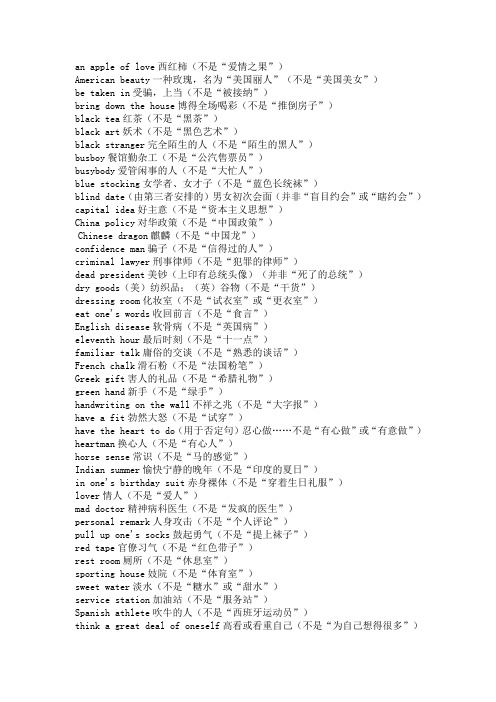
an apple of love西红柿(不是“爱情之果”)American beauty一种玫瑰,名为“美国丽人”(不是“美国美女”)be taken in受骗,上当(不是“被接纳”)bring down the house博得全场喝彩(不是“推倒房子”)black tea红茶(不是“黑茶”)black art妖术(不是“黑色艺术”)black stranger完全陌生的人(不是“陌生的黑人”)busboy餐馆勤杂工(不是“公汽售票员”)busybody爱管闲事的人(不是“大忙人”)blue stocking女学者、女才子(不是“蓝色长统袜”)blind date(由第三者安排的)男女初次会面(并非“盲目约会”或“瞎约会”)capital idea好主意(不是“资本主义思想”)China policy对华政策(不是“中国政策”)Chinese dragon麒麟(不是“中国龙”)confidence man骗子(不是“信得过的人”)criminal lawyer刑事律师(不是“犯罪的律师”)dead president美钞(上印有总统头像)(并非“死了的总统”)dry goods(美)纺织品;(英)谷物(不是“干货”)dressing room化妆室(不是“试衣室”或“更衣室”)eat one's words收回前言(不是“食言”)English disease软骨病(不是“英国病”)eleventh hour最后时刻(不是“十一点”)familiar talk庸俗的交谈(不是“熟悉的谈话”)French chalk滑石粉(不是“法国粉笔”)Greek gift害人的礼品(不是“希腊礼物”)green hand新手(不是“绿手”)handwriting on the wall不祥之兆(不是“大字报”)have a fit勃然大怒(不是“试穿”)have the heart to do(用于否定句)忍心做……不是“有心做”或“有意做”)heartman换心人(不是“有心人”)horse sense常识(不是“马的感觉”)Indian summer愉快宁静的晚年(不是“印度的夏日”)in one's birthday suit赤身裸体(不是“穿着生日礼服”)lover情人(不是“爱人”)mad doctor精神病科医生(不是“发疯的医生”)personal remark人身攻击(不是“个人评论”)pull up one's socks鼓起勇气(不是“提上袜子”)red tape官僚习气(不是“红色带子”)rest room厕所(不是“休息室”)sporting house妓院(不是“体育室”)sweet water淡水(不是“糖水”或“甜水”)service station加油站(不是“服务站”)Spanish athlete吹牛的人(不是“西班牙运动员”)think a great deal of oneself高看或看重自己(不是“为自己想得很多”)white coal(作动力来源用的)水(不是“白煤”)white man忠实可靠的人(不是“皮肤白的人”)yellow book黄皮书(法国政府报告书,以黄纸为封)(不是“黄色书籍”)pull one's leg开玩笑(不是“拉后腿”)make one's hair stand on end令人毛骨悚然—恐惧(不是“令人发指,气愤”)What a shame!多可惜!真遗憾!(不是“多可耻”)You don't say!是吗!(不是“你别说”)You can say that again!说得好!(不是“你可以再说一遍”)I haven't slept better.我睡得好极了。
英语中的歧义与解歧
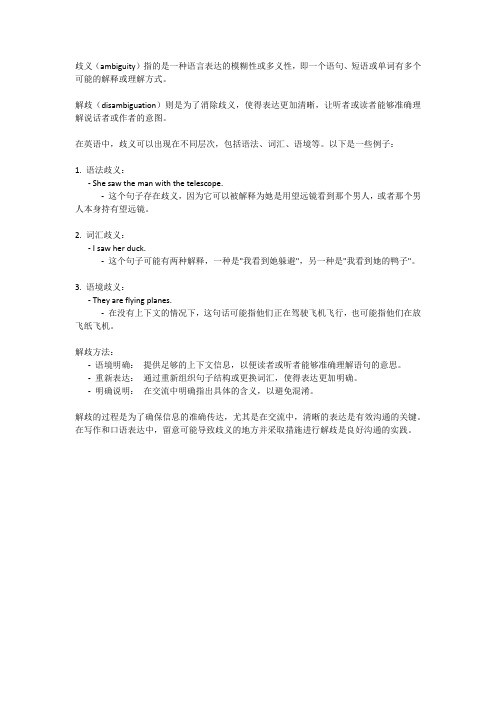
歧义(ambiguity)指的是一种语言表达的模糊性或多义性,即一个语句、短语或单词有多个可能的解释或理解方式。
解歧(disambiguation)则是为了消除歧义,使得表达更加清晰,让听者或读者能够准确理解说话者或作者的意图。
在英语中,歧义可以出现在不同层次,包括语法、词汇、语境等。
以下是一些例子:
1. 语法歧义:
- She saw the man with the telescope.
-这个句子存在歧义,因为它可以被解释为她是用望远镜看到那个男人,或者那个男人本身持有望远镜。
2. 词汇歧义:
- I saw her duck.
-这个句子可能有两种解释,一种是"我看到她躲避",另一种是"我看到她的鸭子"。
3. 语境歧义:
- They are flying planes.
-在没有上下文的情况下,这句话可能指他们正在驾驶飞机飞行,也可能指他们在放飞纸飞机。
解歧方法:
-语境明确:提供足够的上下文信息,以便读者或听者能够准确理解语句的意思。
-重新表达:通过重新组织句子结构或更换词汇,使得表达更加明确。
-明确说明:在交流中明确指出具体的含义,以避免混淆。
解歧的过程是为了确保信息的准确传达,尤其是在交流中,清晰的表达是有效沟通的关键。
在写作和口语表达中,留意可能导致歧义的地方并采取措施进行解歧是良好沟通的实践。
英语词汇歧义的搞笑例子

英语词汇歧义的搞笑例子Man, I thought I ordered a "large" coffee, but theygave me a mug that was bigger than my head! Turns out "large" meant "extra-extra-large" in their dictionary.The other day, my friend said he was going to "hit the gym." I thought he meant to work out, but he actually meant he was going to pick up his brother from the airport. I was waiting for him at the treadmill for hours!My mom asked me to "pass the salt," and I accidentally gave her the pepper. She was so mad, she said, "I didn'task for the spicy one!" Who knew "salt" could be confused with "pepper" sometimes?At the supermarket, I saw a sign saying "freshly squeezed oranges." I thought I was in for a treat, but when I got to the counter, they gave me a bottle of orange juice!I wanted the actual oranges, not the liquid!My boss asked me to "bring up the numbers" for the meeting. I thought he wanted me to physically bring the documents upstairs, but he meant he wanted me to present the financial figures. I showed up with a stack of papers and he just stared at me in confusion.My little sister said.。
英语中产生歧义的翻译以及地道的口语翻译(2)
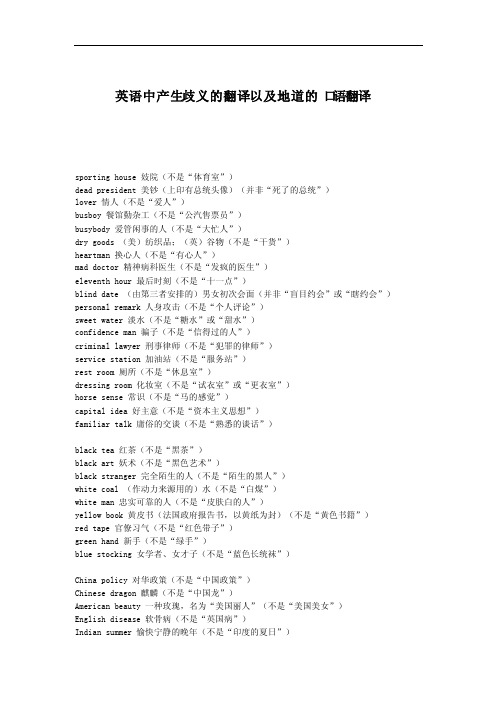
英语中产生歧义的翻译以及地道的口语翻译sporti ng house妓院(不是“体育室”)dead presid ent 美钞(上印有总统头像)(并非“死了的总统”)lover情人(不是“爱人”)busboy餐馆勤杂工(不是“公汽售票员”)busybo dy 爱管闲事的人(不是“大忙人”)dry goods(美)纺织品;(英)谷物(不是“干货”)heartm an 换心人(不是“有心人”)mad doctor精神病科医生(不是“发疯的医生”)eleven th hour 最后时刻(不是“十一点”)blinddate (由第三者安排的)男女初次会面(并非“盲目约会”或“瞎约会”)person al remark人身攻击(不是“个人评论”)sweetwater淡水(不是“糖水”或“甜水”)confid enceman 骗子(不是“信得过的人”)crimin al lawyer刑事律师(不是“犯罪的律师”)servic e statio n 加油站(不是“服务站”)rest room 厕所(不是“休息室”)dressi ng room 化妆室(不是“试衣室”或“更衣室”)horsesense常识(不是“马的感觉”)capita l idea 好主意(不是“资本主义思想”)famili ar talk 庸俗的交谈(不是“熟悉的谈话”)blacktea 红茶(不是“黑茶”)blackart 妖术(不是“黑色艺术”)blackstrang er 完全陌生的人(不是“陌生的黑人”)whitecoal (作动力来源用的)水(不是“白煤”)whiteman 忠实可靠的人(不是“皮肤白的人”)yellow book 黄皮书(法国政府报告书,以黄纸为封)(不是“黄色书籍”)red tape 官僚习气(不是“红色带子”)greenhand 新手(不是“绿手”)blue stocki ng 女学者、女才子(不是“蓝色长统袜”)Chinapolicy对华政策(不是“中国政策”)Chines e dragon麒麟(不是“中国龙”)Americ an beauty一种玫瑰,名为“美国丽人”(不是“美国美女”)Englis h diseas e 软骨病(不是“英国病”)Indian summer愉快宁静的晚年(不是“印度的夏日”)Greekgift 害人的礼品(不是“希腊礼物”)Spanis h athlet e 吹牛的人(不是“西班牙运动员”)French chalk滑石粉(不是“法国粉笔”)2.习语类pull one's leg 开玩笑(不是“拉后腿”)in one's birthd ay suit 赤身裸体(不是“穿着生日礼服”)eat one's words收回前言(不是“食言”)an appleof love 西红柿(不是“爱情之果”)handwr iting on the wall 不祥之兆(不是“大字报”)bringdown the house博得全场喝彩(不是“推倒房子”)have a fit 勃然大怒(不是“试穿”)make one's hair standon end 令人毛骨悚然—恐惧(不是“令人发指——气愤”)be takenin 受骗,上当(不是“被接纳”)thinka greatdeal of onesel f 高看或看重自己(不是“为自己想得很多”)pull up one's socks鼓起勇气(不是“提上袜子”)have the heartto do (用于否定句)忍心做……不是“有心做”或“有意做”)3.短句类What a shame!多可惜!真遗憾!(不是“多可耻”)You don't say! 是吗!(不是“你别说”)You can say that again!说得好!(不是“你可以再说一遍”)I haven't sleptbetter. 我睡得好极了。
地道的歧义英语词

背熟73个固定搭配,保你写出地道英语作文来源:杨旭远Apollo的日志1.american beauty是“月季”,而不是“美国美人”。
2.Dutch act是“自杀”,而不是“荷兰人的行动”。
3.Dutch door是“杂志中的散页广告”,而不是“荷兰门”。
4.Dutch uncle是“唠唠叨叮的人”,而不是“荷兰大叔”。
5.Dutch wife是“竹、藤睡具”,而不是“荷兰老婆”。
6.go Dutch是“各人自己付钱”,而不是“去荷兰”。
7.Take French leave是“不告而别”,而不是“请法国假”。
8.Russia dressing是“蛋黄酱”,而不是“俄罗斯服装”。
9.a Greek gift是“害人的礼物”,而不是“希腊的赠品”10.Spanish- athlete是“胡说的人”,而不是“西班牙运动员”。
11.two-time是“对人不忠”,而不是“两次”。
12.in two twos是“立刻”,而不是“两两之间”。
13.three-score是“六十”,而不是“三分”14.four hundred是“名流、上层”,而不是“四百”15.five-finer是“贼”,类似汉语的“三只手”,而不是“五指”16.at sixes and sevens是“乱七八糟”,而和“六”无关。
17.tight-ball是“老实人”,这里的“八”和“发”无关。
18.to the tens是“打扮得极为华丽”,而不是“数到十”19.a white day是“良晨吉日”,而不是“大白天”。
20.a white elephant是“沉重的负担”,而不是“白象”。
21.green-eyed是“红眼病”,而不是“绿眼病”22.green hand是“生手”,而不是“绿手”23.green horn是“新移民”,而和“牛羊的角”无关24.white lie是“善意的谎言”,而和“白色”无关。
25.green back是“美钞”,而不是“绿毛龟”.26.yellow back是“法国廉价小说”,而不是“黄背”。
引起歧义的英文
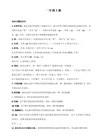
All his friends did not turn up. 他的朋友没全到。(不是“他的朋友全没到”)
People will be long forgetting her. 人们在很长时间内会记住她的。(不是“人们会永远忘记她”)
I haven't睡过好觉”)China policy 对华政策(不是“中国政策”)
Chinese dragon 麒麟(不是“中国龙”)
American beauty 一种玫瑰,名为“美国丽人”(不是“美国美女”)
English disease 软骨病(不是“英国病”)
have the heart to do (用于否定句)忍心做……不是“有心做”或“有意做”)
What a shame! 多可惜!真遗憾!(不是“多可耻”)
You don't say! 是吗!(不是“你别说”)
You can say that again! 说得好!(不是“你可以再说一遍”)
Indian summer是秋老虎的意思好不好…sporting house 妓院(不是“体育室”)
dead president 美钞(上印有总统头像)(并非“死了的总统”)
lover 情人(不是“爱人”)
busboy 餐馆勤杂工(不是“公汽售票员”)
busybody 爱管闲事的人(不是“大忙人”)
rest room 厕所(不是“休息室”)
dressing room 化妆室(不是“试衣室”或“更衣室”)
horse sense 常识(不是“马的感觉”)
容易产生歧义的双语对照句型

容易产生歧义的双语对照句型本页仅作为文档页封面,使用时可以删除This document is for reference only-rar21year.March趣看中国人最易误解的45句话1. The house is really A-1.(误译)那间房子的门牌确实是A-1号。
(正译)那间房子确实是一流的。
bought a baker’s dozen of biscuits.(误译)他买了面包师做的12块饼干。
(正译)他买了13块饼干。
bull of Bashan woke the sleeping child with his noise.(误译)贝兴的一头公牛弄醒了那个酣睡的孩子。
(正译)一个大嗓门的人把那个酣睡的孩子吵醒了。
was a cat in the pan.(误译)他是盘子中的一只猫。
(正译)他是个叛徒。
cat may look at a king.(误译)一只猫都可以看到国王。
(正译)小人物也该有同等权利。
a hair of dog didn’t make him feel better.(误译)即使一根狗毛也不会使他觉得好些。
(正译)即使是再喝解宿醉的一杯酒,也不会使他觉得好些。
he a Jonah(误译)他就是叫约拿吗(正译)他是带来厄运的人吗is fond of a leap in the dark.(误译)吉姆喜欢在黑暗处跳跃。
(正译)吉姆喜欢冒险行事。
little bird told me the news.(误译)一只小鸟将此消息告诉我。
(正译)消息灵通的人士将此消息告诉我。
is a man of a woman.(误译)安吉拉是个有妇之夫。
(正译)安吉拉是个像男人的女人。
is a man of his word.(误译)内莉是他所说的那个人。
(正译)内莉是个守信用的人。
paid a matter of 1000 yuan.(误译)他付了1000元的货物账。
42歧义翻译

1.Do you have a family?正解:你有孩子吗?2.It's a good father that knows his son。
就算是最好的父亲,也未必了解自己的儿子。
3.I have no opinion of that sort of man。
我对这类人很反感。
4.She put 5 dollars into my hand,"you have been a great man today."她把5美圆塞到我手上说:"你今天表现得很好."5.I was the youngest son, and the youngest but two。
我是最小的儿子,但是我还有两个妹妹。
6.The picture flattered her。
她比较上照。
7.The country not agreeing with her, she returned to England。
她杂那个国家水土不服,所以回到了英国。
8. He is a walking skeleton。
他很瘦。
9.The machine is in repair。
机器已经修好了。
10.He allowed the father to be overruled by the judge, and declared his ownson guilty。
他让法官的职责战胜了父子的亲情,最终宣布儿子有罪。
11.You don't know what you are talking about。
你在胡说八道。
12.You don't begin to understand what they mean。
你根本不知道他们在干嘛. don't begin :决不13.They didn't praise him slightly。
他们大大地表扬了他。
14.That's all I want to hear。
容易产生歧义的英语句子

容易产生歧义的英语句子1. "I saw her duck."这句话可能产生歧义,因为它有两个可能的含义,一是“我看到了她躲避”,二是“我看到了她的鸭子”。
1. I saw her duck and it was so cute. (我看到了她的鸭子,很可爱。
)2. I saw her duck and she quickly moved out of the way. (我看到她躲开了。
)3. The hunter saw the duck fly away. (猎人看到鸭子飞走了。
)4. The waitress saw the duck in the pond. (女服务员看到了池塘里的鸭子。
)5. I saw her duck and realized it was a decoy. (我看到了她的鸭子,发现它是一个诱饵。
)6. He saw the duck-headed cane and thought it was a real duck. (他看到鸭头手杖,以为是真的鸭子。
)7. She saw the duck-shaped cloud in the sky. (她看到了天空中鸭子形状的云。
)8. The chef saw the duck on the menu and immediately started to prepare it. (厨师看到菜单上的鸭子,立刻开始准备。
)2. "I'm sorry. I love you."这句话也有两种可能的含义,一是“我很抱歉”,二是“我爱你”。
1. I'm sorry, I love you. (我很抱歉,我爱你。
)2. I can say I'm sorry, but I can never say I love you enough. (我可以说我很抱歉,但我永远无法表达出我对你的爱。
容易产生歧义的英文短语

容易产生歧义的英文短语英语里面有很多“表里不一”的短语,在翻译的过程中,如果“望文生义”,就会让人不知所云,有时甚至令人啼笑皆非。
下面就有一组容易产生异义的英文短语及几个句子:carry the house 博得全场喝彩(不是“搬家”)busy body 爱管闲事的人( 不是“忙人”)an afternoon farmer [俚]拖拉的人eleventh hour 最后时刻(不是“十一点钟”)an eye for an eye 以牙还牙a hot potato 棘手的问题a small potato [美俚] 微不足道的人或物dry goods 纺织品,谷物(不是“干货”)Milk Way 银河(不是“牛奶路”)man of letters 文学家(不是“写信的人”)sleep late 睡懒觉(不是“睡得很晚”)sweet water 淡水,饮用水(不是“糖水,甜水”)familiar talk 庸俗的谈话(不是“熟悉的谈话”) walkman 随身听(不是“行走的男人”)night bird 夜猫子(不是“夜间的鸟”)dog days 三伏天(不是“狗的日子”)hot dog 热狗(不是“炎热的狗”)great cats 狮、虎、豹等猫科动物(不是“巨大的猫”) touch-me-not 含羞草(不是“别碰我”)bad sailor 晕船(不是“坏水手”)car park 停车场(不是“汽车公园”)big boy [俚]百元钞票field flowers 野生的花a field worker 实地工作者China grass 苎麻(不是“中国草”)China tree 楝树(不是“中国树”)French window 落地长窗(不是“法国窗”)English disease 软骨病(不是“英国病”)French chalk 滑石粉(不是“法国粉笔”)Russian boot 长筒靴(不是“俄罗斯皮靴”)Russian blue 淡蓝色(不是“俄罗斯蓝色”)bright and early 一大早a fast friend 可靠的朋友fast time 夏令时间stand fast 不后退;屹立不动;不让步Stand easy ! [英] 稍息!What a sell ! 真失望!buy it (回答问题或谜语时用)放弃 e.g. I'll buy it . 我答不出(或者我不晓得)Dear John letter [美口] 绝交信broken English 不标准的英语a broken man (在精神等方面)潦倒的人Catch me ! 我可不会再干那样的事了。
有歧义的英语句子语法

有歧义的英语句子语法1. 寻求英语中的歧义句子歧义句子= squinting modifier (a common grammatical error)i.e.1) [WRONG] Defining your terms clearly strengthens your argument. (does defining "clearly strengthen" or does "defining clearly" strengthen?)[RIGHT] Defining your terms will clearly strengthen your argument. OR A clear definition of your terms strengthens your argument.2) Students who miss classes frequently fail the course.We can't tell which part of the sentence the word frequently is supposed to modify. Look at these two possible meanings: Students who miss class frequentlyorfrequently fail the course.Correct a squinting modifier error by repositioning the modifier to place it next to the word it modifies.3) # Writing an essay (clearly) will improve your grade.# I told Merdine (when the game was over) I would drive her to the bingo hall.# Instructors who cancel classes (rarely) are reprimanded.4) The marathon coordinator said Friday we would have a trial run.—(Did the coordinator give this information on Friday, or is the trial run on Friday?)The company representative told us eventually the president would meet with us.—(Did the representative eventually tell us, or did the president eventually meet with us?)5) WRONG : "I said eventually I would do it."RIGHT: "Eventually, I said I would do it"or"I said I would do it eventually."2. 英语里没有语病又有歧义的句子有哪些比如说“Leave the book on the shelf"你可以理解为,把书放在书架上,或者是不要碰书架上的书。
- 1、下载文档前请自行甄别文档内容的完整性,平台不提供额外的编辑、内容补充、找答案等附加服务。
- 2、"仅部分预览"的文档,不可在线预览部分如存在完整性等问题,可反馈申请退款(可完整预览的文档不适用该条件!)。
- 3、如文档侵犯您的权益,请联系客服反馈,我们会尽快为您处理(人工客服工作时间:9:00-18:30)。
an apple of love 西红柿(不是“爱情之果”)
American beauty 一种玫瑰,名为“美国丽人”(不是“美国美女”)be taken in 受骗,上当(不是“被接纳”)
bring down the house 博得全场喝彩(不是“推倒房子”)
black tea 红茶(不是“黑茶”)
black art 妖术(不是“黑色艺术”)
black stranger 完全陌生的人(不是“陌生的黑人”)
busboy 餐馆勤杂工(不是“公汽售票员”)
busybody 爱管闲事的人(不是“大忙人”)
blue stocking 女学者、女才子(不是“蓝色长统袜”)
blind date (由第三者安排的)男女初次会面(并非“盲目约会”或“瞎约会”)
capital idea 好主意(不是“资本主义思想”)
China policy 对华政策(不是“中国政策”)
Chinese dragon 麒麟(不是“中国龙”)
confidence man 骗子(不是“信得过的人”)
criminal lawyer 刑事律师(不是“犯罪的律师”)
dead president 美钞(上印有总统头像)(并非“死了的总统”)dry goods (美)纺织品;(英)谷物(不是“干货”)dressing room 化妆室(不是“试衣室”或“更衣室”)
eat one's words 收回前言(不是“食言”)
English disease 软骨病(不是“英国病”)
eleventh hour 最后时刻(不是“十一点”)
familiar talk 庸俗的交谈(不是“熟悉的谈话”)
French chalk 滑石粉(不是“法国粉笔”)
Greek gift 害人的礼品(不是“希腊礼物”)
green hand 新手(不是“绿手”)
handwriting on the wall 不祥之兆(不是“大字报”)
have a fit 勃然大怒(不是“试穿”)
have the heart to do (用于否定句)忍心做……不是“有心做”或“有意做”)
heartman 换心人(不是“有心人”)
horse sense 常识(不是“马的感觉”)
Indian summer 愉快宁静的晚年(不是“印度的夏日”)
in one's birthday suit 赤身裸体(不是“穿着生日礼服”)
lover 情人(不是“爱人”)
mad doctor 精神病科医生(不是“发疯的医生”)
personal remark 人身攻击(不是“个人评论”)
pull up one's socks 鼓起勇气(不是“提上袜子”)
red tape 官僚习气(不是“红色带子”)
rest room 厕所(不是“休息室”)
sporting house 妓院(不是“体育室”)
sweet water 淡水(不是“糖水”或“甜水”)
service station 加油站(不是“服务站”)
Spanish athlete 吹牛的人(不是“西班牙运动员”)
think a great deal of oneself 高看或看重自己(不是“为自己想得很多”)
white coal (作动力来源用的)水(不是“白煤”)
white man 忠实可靠的人(不是“皮肤白的人”)
yellow book 黄皮书(法国政府报告书,以黄纸为封)(不是“黄色书籍”)
pull one's leg 开玩笑(不是“拉后腿”)
make one's hair stand on end 令人毛骨悚然—恐惧(不是“令人发指,气愤”)
What a shame! 多可惜!真遗憾!(不是“多可耻”)
You don't say! 是吗!(不是“你别说”)
You can say that again! 说得好!(不是“你可以再说一遍”)
I haven't slept better. 我睡得好极了。
(不是“我从未睡过好觉”)
You can't be too careful in your work. 你工作越仔细越好。
(不是“你工作不能太仔细”)
It has been 4 years since I smoked. 我戒烟4年了。
(不是“我抽烟4年了”)
All his friends did not turn up. 他的朋友没全到。
(不是“他的朋友全没到”)
People will be long forgetting her. 人们在很长时间内会记住她的。
(不是“人们会永远忘记她”)
He was only too pleased to let them go. 他很乐意让他们走。
(不是“他太高兴了,不愿让他们走”)
It can't be less interesting. 它无聊极了。
(不是“它不可能没有趣”)。
